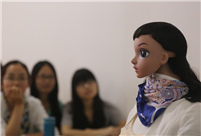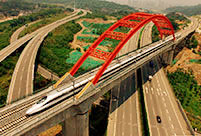

WASHINGTON, June 5 -- A new wave of China-bashing is currently surging to a new height in the U.S. with the latest accusation against China for hacking U.S. federal computer networks, threatening to have harmful implications on the Sino-U.S. relations.
The recent anti-China hysteria moved another notch up Thursday when the U.S. Department of Homeland Security said massive data from the Office of Personnel Management and the Interior Department had been compromised in hacking attacks. Quoting unnamed U.S. officials and Congressional sources, U.S. media quickly pointed a finger at China for the hacking, without providing further proof.
These allegations and accusations seem to be part of a U.S. witch-hunt of China following the heightened tensions over the rift on China's building activities in the disputed South China Sea.
China's insistence on its right to build facilities on its islands and reefs despite the U.S. calls for a halt has apparently angered a stable group of anti-China hardliners in Washington who have long urged the Obama administration to get tough on Beijing, that was viewed by them as top U.S. strategic rival.
Recently, across forums at U.S. think tanks, hearings at the Capitol Hill and even briefing rooms of major U.S. government agencies, the chorus of demonizing China has kept growing louder since early this year when U.S. media outlets published satellite pictures showing China's land reclamation in the South China Sea.
Out of disappointment or possibly despair, the U.S. has plotted meticulously to defame China as a regional bully, troublemaker and culprit to destabilize the U.S.-dominant regional order in Asia. Washington has rejected China's explanation that its building activities are fully within the scope of sovereignty and mainly for civilian purposes, and tuned up its verbal attacks against China on any possible occasion.
Some American experts touted their surmise of China's " impending collapse," some warned the Sino-China ties have reached a tipping point to head for conflict, while a few others called for drawing "a red line" to counter what they called China's " aggression."
More than that, the U.S. military has even staged a show of force to China by sending reconnaissance planes to fly over China' s islands and reefs in the South China Sea, which was intentionally showcased to the world through the camera of a global TV news network. It has also threatened to continue such flights in future to challenge China's legal claims, while working hard to create a shadow military alliance to encircle China.
People can also smell rat from some recent moves taken by the U. S. government, including the charges filed against some Chinese professors for so-called theft of trade secrets and against a dozen of Chinese students in the U.S. for fraud and cheating on tests. All the timings are subtly synchronized with the development of Washington's rift with China over the South China Sea.
Honestly, it is exactly the lack of mutual trust and respect that has created the recent tensions in the Sino-U.S. relationship, one of the most consequential ties in today's world.
For too long time that the two countries have easily fell into the trap of political bias, ideological paranoia and lingering misunderstanding despite the flouring bilateral trade and people- to-people exchanges. This is evident in the recurrent fluctuation in the Sino-U.S. bilateral ties in the past four decades.
In this sense, Washington should be blamed for the tensions due to its distrust towards China's policies, intentions and actions. The latest developments highlight once again the importance of reflecting on the historical lessons of great power rivalry and the need for the two sides to work harder to foster mutual trust and respect.
Perhaps the upcoming Strategic and Economic Dialogue and the High-level Consultation on the People-to-People Exchange in late June will serve as an ideal opportunity to do that. And most importantly, the scheduled state visit to the U.S. by Chinese President Xi Jinping in September will hopefully help further cool down the temperature.
Basically, Washington needs to stop its witch-hunt of China, tune down its criticism of China, and learn to accommodate China in an unbiased way. Otherwise, the rivalry between the two powers is destined to worsen and have a destabilizing effect on world peace and security.
 J-11 fighters in air exercise
J-11 fighters in air exercise Beauties dancing on the rings
Beauties dancing on the rings Charming robot teacher gives lecture in Jiangxi
Charming robot teacher gives lecture in Jiangxi Hefei-Fuzhou railway line put into trial operation
Hefei-Fuzhou railway line put into trial operation Graduation season of a costume designing major
Graduation season of a costume designing major PLA soldiers operate antiaircraft guns in drill
PLA soldiers operate antiaircraft guns in drill Villagers pick cubiloses on cliff in Sichuan
Villagers pick cubiloses on cliff in Sichuan Attendants-to-be join Mr. & Miss Campus Contest
Attendants-to-be join Mr. & Miss Campus Contest China hosts overseas disaster relief exercise for the first time
China hosts overseas disaster relief exercise for the first time Manila overvalues new pact with Tokyo
Manila overvalues new pact with Tokyo The mysterious ‘people of Chaoyang district’
The mysterious ‘people of Chaoyang district’ NDRC mulls new guidelines for auto sector
NDRC mulls new guidelines for auto sector Opportunists in Hong Kong target traders to exploit resentment of mainland
Opportunists in Hong Kong target traders to exploit resentment of mainlandDay|Week